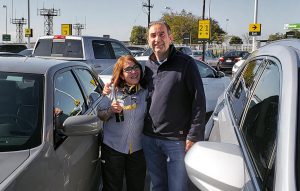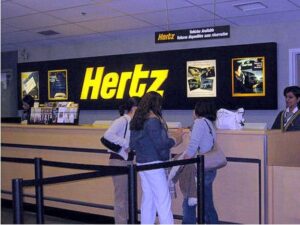Devastated by the coronavirus pandemic, the travel industry is struggling to survive – and that is likely to make things more difficult for the auto industry.
With airports and hotels all but empty, only those with essential needs still traveling, rental car companies like Budget and Avis have seen business tumble by as much as 90% since a near-nationwide lockdown began in mid-March. Industry giant Hertz announced on April 20 that it would lay off more than a third of its 29,000 North American employees while working to restructure $17 billion in debt.
With few reservations, Hertz and the rest of the rental car companies also are taking steps to reduce one of their biggest budget line items. And that could mean cutting back the acquisition of nearly 1 million new cars, trucks and crossovers this year, according to a new forecast by J.D. Power.
(As America slowly reopens, auto sales could be blazing the path.)
“Demand for rental replacements has basically gone away,” Jonathan Banks, a senior analyst with Power, said during a media webinar this week.
The situation is dire enough that General Motors has agreed to cancel the order for some vehicles earmarked for Hertz Global Holdings, Avis Budget Group and Enterprise Holdings, according to a report by the Bloomberg news service. The three rental firms won’t take delivery of new vehicles until at least July, Bloomberg said, referencing an unnamed source.

Business at rental car agencies, like Hertz, are down significantly, cutting the need for new vehicles from automakers.
Separately, Hertz said in a public filing on Tuesday that it does not expect to add any new vehicles to its fleet through the end of 2020.
Hyundai confirmed it has agreed to similar cuts in the delivery of vehicles originally bound for rental firms. And Toyota officials also confirmed rental car sales have plummeted.
The cuts come as no surprise to those watching the travel industry as a whole. A broad consensus among experts is that things could take 18 to 24 months to return to normal. A new survey by travel industry research firm Longwoods International found that 82% of Americans have changed travel plans for the next six months due to concerns about the coronavirus. Fully 50% plan to cancel trips, according to the study which targeted 1,000 American adults. Another 45% plan to reduce travel.
(Collapsing auto sales, earnings raise talk of bailout – or sales stimulus – program.)
Other research has shown a marked shift to “staycations,” or to travel relying on personal vehicles rather than by air, rail or boat, major sources of business for rental car companies.
For all of 2020, Power analyst Banks said he expects rental car companies in the U.S. to acquire no more than 1 million new vehicles, down from a pre-pandemic forecast of at least 1.9 million.
That’s a serious setback for an industry that depends on fleet sales overall to account for about 20% of its annual volume – and for rental companies to make up the largest single source of those fleet sales. Losing nearly 1 million sales would alone account for about a 6% decline compared to the 17.1 million vehicles sold in the U.S. in 2019.

The silver lining in the expected drop in fleet sales is that when the plants do fire back up, dealers short on certain vehicles will get new models sooner.
The question is whether things are approaching bottom. With epidemiologists warning there could be additional waves of COVID-19 coming late this year and perhaps into 2021, the travel industry could be facing a dismal future, with still more cuts in purchases by rental car companies next year.
In the near-term, there may be a positive side to the plunge in rental car fleet buys. With the North American automotive production network only beginning to reopen, dealer inventories have plunged, according to J.D. Power data. Cars originally bound for Hertz, Avis and their competitors are being redirected to retailers who, in many cases, can use them now that consumer purchases are beginning to rebound.
(GM pulls the plug on Maven car-sharing service.)
But there’s also a long-term downside, according to analyst Banks. In more normal times, a company like Hertz or Enterprise will hang on to a vehicle anywhere from 4 to 22 months, the average being 13 months, according to industry data. At that point, they are pumped back into the used car system, many being offered as high-value Certified Pre-Owned, or CPO, vehicles. That part of the used car market could take a substantial hit in 2021, said Banks.

